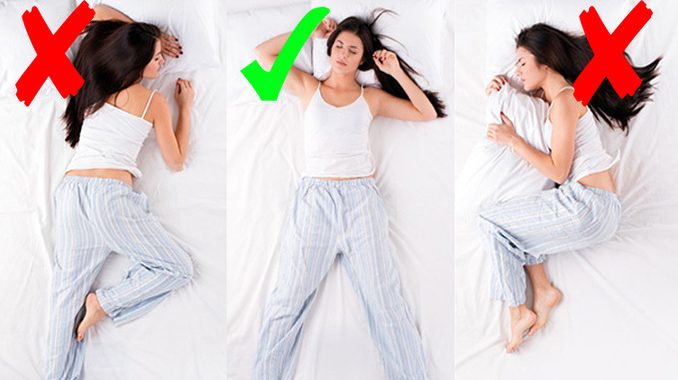
People are likely to sleep in any condition because they feel most comfortable, but this is the preferred condition and ends with health problems, from acne sleep apnea and spinal problems. There are different sleeping positions that people usually sleep with. Read ahead of the pros and cons of some common sleeping positions.
Fetal
Pros:
Most people sleep in a fetal position in all sleep conditions, this condition creates a natural curve of the spine that occurs in our body when we are a fetus in the womb. It provides relief from a long day of work in a straight spine and improves circulation and is especially beneficial during pregnancy as it helps the nutrients reach the baby.
Cons:
This condition can make you feel difficulty in breathing and eventually damage the spine and blood because this condition does not support the spine properly.
Sleeping over side
It is studied that as we get closer to adulthood, more and more people like their side. Most people sleep on their sides around the 60s. When we sleep, there are two differences, some people like to sleep on the left and some on their right. Both conditions have different effects on the body.
Sleeping over the right side
Pros:
Sleeping on the right side is good for the heart and is said to prevent heart attack at bedtime.
Cons:
But sleeping on the right side can cause numbness in your arm, acidity and heartburn because it is easier for stomach acids to come through the esophagus when we sleep on the right side.
Sleeping over the left side
Pros:
If you are a side sleeper, you should consider sleeping on your left side. It reduces acid reflux and heartburn, improves digestion and flushes out toxins from the lymph nodes, improves blood circulation and helps your brain clean up waste.
Cons:
Sleeping on the left side can put pressure on the stomach and lungs and too much pressure on the shoulders.
Note: You should keep your feet stacked, as it can inadvertently rotate your spine, causing pain in your hips.
Sleeping over stomach
Pros:
It reduces chronic snoring and helps in sleep apnea.
Cons:
This is the worst sleeping position, especially if for people with back problems. For starters, this position flattens out the natural curve of your spine. This puts some severe pressure on your neck since sleeping on your stomach, meaning that you keep your head in the side all night, which in turn messes with the natural alignment of your spine.
Also Read: You Can Blame Your Worst Habit on Your Sun Sign
Sleeping over back
Pros:
Sleeping on your back is a potentially ideal sleeping position to support the spine. Since it spreads the body weight evenly backward and it does not make too many readings overnight. In addition, you can also prevent acid reflux by sleeping on your back because your esophagus is slightly higher than the stomach. This condition is great for preventing wrinkles or sagging because nothing happens because of pressure on your face or on your breast.
Cons:
Sleeping back can cause apnea and chronic snoring as it destabilizes your upper air. This makes the spine flat all night and can eliminate undue pressure.
How to prevent the effects of a bad position?
Most of the problem is caused by the wrong position of the spinal cord as it contains 33 bones and must be in their natural position. A person can improve the position of the spine by ensuring the spine, shoulders, and hips are all in the same line, and that the back is properly supported. The best way to do this is usually to sleep on the back and choose a good mattress.
Sleep is an important time for the body to recover and freshen up, but for many people, time spent in bed suffers from back pain. People with severe back pain may find it difficult to get good sleep, and sleeping in an unsupported position can cause back pain.
Conclusion
Sleep status should play a leading role in deciding which mattress you should buy. Every sleeping position demands unique support based on the number of bulging and convex areas created between your body and the mattress. The right mattress for a person’s body will provide support to these gaps, but also the right amount of support in deeper layers to keep your layers properly aligned.
An ideal soft mattress can also reduce the effects of poor sleeping posture and help in falling asleep faster.
